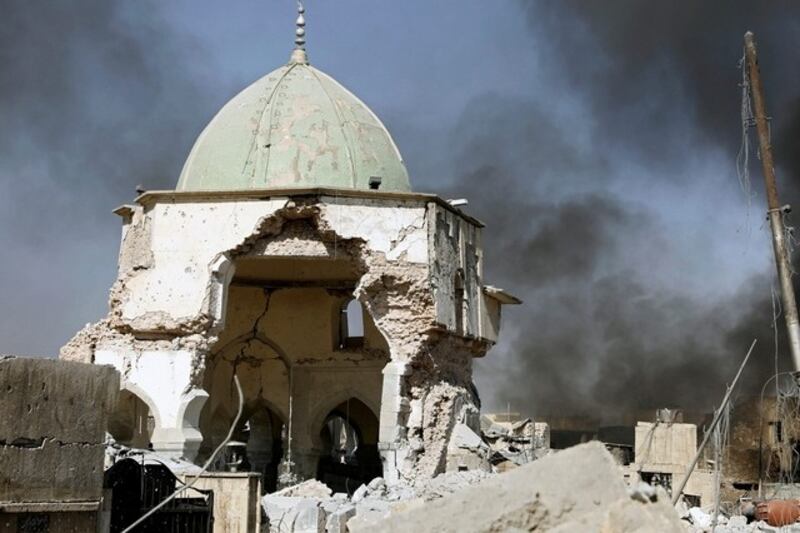ISIL’s self-declared state has come to an end, Iraqi prime minister Haider Al Abadi said on Thursday after troops took control of the area around Mosul’s Al Nouri mosque, where the terror group’s leader proclaimed its "caliphate" three years ago.
"We are seeing the end of the fake Daesh state," Mr Al Abadi said on his Twitter account.
Iraqi forces advancing into the Old City, the last area of Mosul that has not been cleared of the insurgents, had reported reaching within metres of the mosque at daybreak on Thursday.
The advance by elite counterterrorism units known as the Iraqi Special Operations Forces is the latest incremental gain in a battle that began in October last year, when the operation to liberate Iraq’s second largest city was launched.
ISIL blew up the mosque and its famous leaning minaret on June 21 as troops drew close after launching an offensive into the Old City three days earlier. Although now little more than a pile of rubble next to the base of the minaret, Al Nouri is still a coveted prize laden with symbolism.
ISIL chief Abu Bakr Al Baghdadi strode through the mosque to declare the rebirth of the caliphate, defunct since the end of the Ottoman Empire, from its pulpit in July 2014. The insurgents had just taken Mosul, routing tens of thousands of security personnel and capturing vast amounts of weapons and materiel.
The extremists’ self-proclaimed state at that time stretched across vast swathes of Iraq and Syria, and continued to advance on Baghdad. Iraq’s disintegrating regular army was unable to stem the tide, but eventually elite units, Shiite militia groups and air strikes by the US-led coalition halted the insurgents’ advance.
With the steady support of the coalition, the Iraqi military was rebuilt, while Iran continued its support of the militias, and ISIL’s gains were gradually rolled back over the past three years.
While ISIL is in its death throes in Mosul, declarations of a final victory are premature. The insurgents still hold about half of the maze of narrow alleyways and sturdy stone buildings that make up the Old City. Several hundred of the group’s fighters are thought to still be manning a defence, and thousands of civilians are trapped there, unable to escape until Iraqi forces reach them.
ISIL shoots at families trying to cross the front lines, intent on keeping the civilians as human shields against attacks from the air and the ground. The tactic has not prevented an intensive bombardment of the Old City to destroy ISIL’s defensive positions and set off explosive booby traps. Pushing into the densely packed and heavily destroyed historic core from three sides, Iraqi troops frequently advance over rubble covering the corpses of militants and civilians alike.
ISIL has also managed to infiltrate liberated areas. Up to 50 militants launched a surprise attack in the Tanak and Yarmouk neighbourhoods in west Mosul on Monday, drawing several ISOF units away from the Old City before being killed. Sleeper cells also still pose a problem in east Mosul, which was fully liberated in January.
ISIL continues to have a presence in the deserts of Anbar province in western Iraq. It holds a pocket of land around the town of Hawija, and its jihadists are still holding out in the town of Tel Afar north of Mosul.
Throughout the three years of war, ISIL has been able to launch deadly terror attacks in towns and cities under government control, with Baghdad in particular suffering from repeated bombings.
In Syria, the battle to wrest control of Raqqa, ISIL’s self-declared capital, is far from over, and the group continues to hold sizeable territory around Deir Ezzor.
Vanquishing ISIL in Mosul will nevertheless be a significant victory for the Iraqis. It marks the end of the self-styled caliphate in Iraq, and proves that the insurgents no longer pose an existential threat to the military. The focus will soon shift to eliminating the last pockets of ISIL resistance elsewhere, and to containing the group as an insurgent and terrorist menace.





